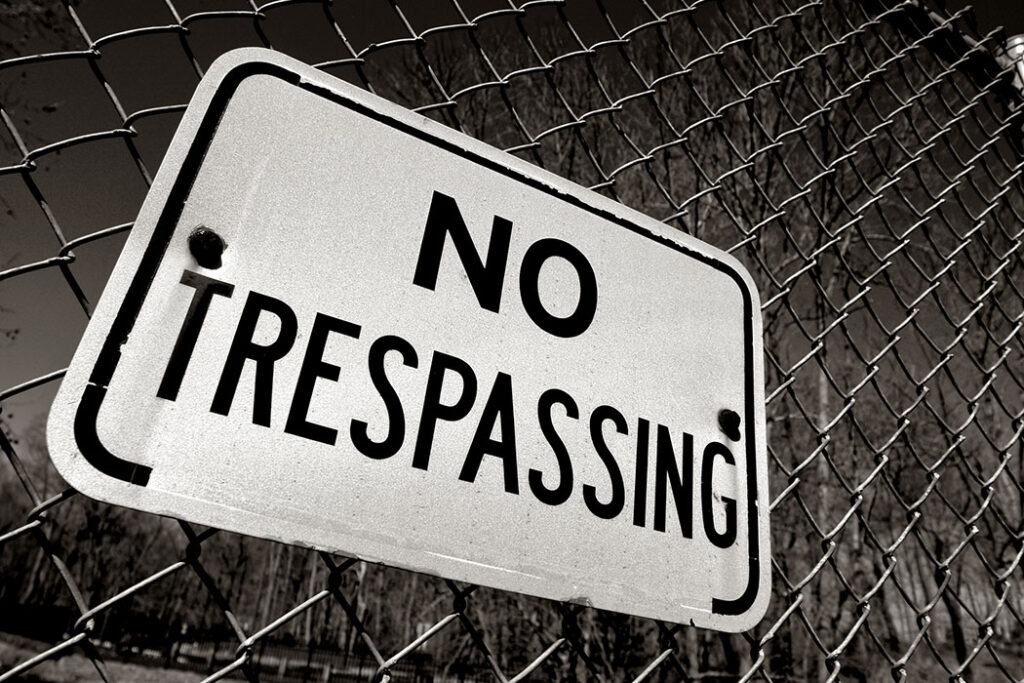All experienced PIs know that they have to stay within the lines – but trespassing can pose an especially rigorous temptation, especially if the information that a PI is after remains just out of reach. It’s why there are always ongoing cases about private investigates snooping on computers at a business to gather protected data or other cases of trespassing that are clearly illegal, no matter what results they provide.
Since reminders are always helpful, let’s take a look at what every PI should know about trespassing, and just where the lines are when collecting information.
Private Property is Still Private
There is no circumstance when a private investigator can legally go onto private property on their own, no matter what their purpose. This is always breaking the law, the same as it is with anyone. No special regulations give PIs the ability to trespass where other people cannot.
If you would like to access property that is owned by someone else, there is a very easy way to do this: The property owner can simply invite you to be there. Without this invitation, you cannot make up any reason to trespass. Even the police need legal cause and usually a warrant to go onto private property.
Keep this general rule in mind – especially in more complicated situations like investigating a rental property – and you’ll avoid almost all trespassing problems.
Personal Mail Is Off Limits
This is another area where PIs can still get in a lot of trouble even though the law is clear. You can’t root through someone’s mail and open letters looking for evidence. Physically, this doesn’t always feel like trespassing to a PI, which is why these problems sometimes arise. But in the eyes of the law, reading someone else’s mail is also a clear violation, as much related to trespassing as to hacking. You can’t just access personal data like this.
For a legal option, you can use background check services, investigate criminal records, and see if someone has undeclared bank accounts (although you cannot legally see any account activity). Any PI with the right training can do these things, and they frequently yield more valuable information than opening mail.
Company Data is Always Protected
The laws don’t suddenly change when a PI is investigating a business instead of someone’s home. Trespassing on a business property where you are not allowed is still trespassing. There is no gray area here just because the business allows customers to use certain areas of the building: That does not make it legal to go anywhere the business doesn’t want the public. Companies invest a great deal of money in security and monitoring services for a reason. If you want to take a look at any part of the business that’s not open to the public, you need the permission of the business owner.
As with the case cited in the beginning, this is particularly compounded when private investigators trespass on a business and then use that to access data on a work computer. Don’t make one violation worse but adding data theft to the problem!
No Breaking Into Homes or Vehicles
Combined with trespassing rules, it should be obvious that breaking into a house is straightforward burglary (no matter what excuse is made), and every PI should avoid it. Breaking into cars falls under the same rules, even though the car may not technically be on someone’s property. It still is someone’s property and taking something from it is still theft. You can monitor where a vehicle goes, but there’s no special spot where breaking into it is allowed.
Trash Is Almost Always Fair Game
One significant exception to privacy laws in most areas is trash. If someone has put something – say a document or other evidence – in their trash, then PIs can usually access it without running into legal problems. The key is that the trash must be in an area that can be accessed by the public, like the curbside of a street or a dumpster in an alleyway. It may be dirty work, but as far as the law is concerned, you’re clean.
Remember that Evidence Can Be Compromised
This is particularly important if you are working for an attorney, but is applicable for all private investigation firms. The evidence tainted by your own crimes cannot be used in court. The exclusionary rule applies here, and no exceptions like those granted to police with a warrant are available to PIs. Do not let your hard work go to waste!
As Usual, Laws Can Vary By State
Trespassing and related laws can differ from state to state, so it is always important to look up your specific state regulations here. Two key areas where state laws may differ:
- Consent to go on private property may vary: Some states can make this exceedingly difficult even if you get consent from the owner first. Other states have specific allowances where this type of trespassing is allowed with specific designations – for process servers, usually.
- Loitering exceptions: Many states have loitering laws that prevent people from just waiting outside a property for long periods of time. However, some states have specific exemptions for private investigators that keep loitering laws from applying.
Final Thoughts
Following your state’s trespassing laws carefully will help your investigation company avoid any legal problems and ensure that evidence you collect is still submissible, if necessary. For more tips and important information on other legal issues PIs should know about, visit our blog.






